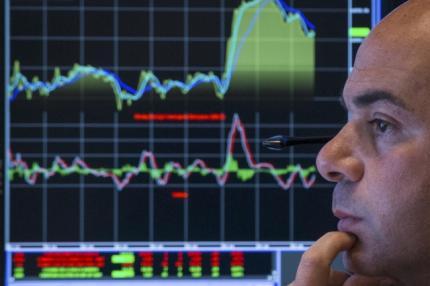European Equities Hit by Factory Data; Ebola Triggers U.S. Caution
Bareksa • 02 Oct 2014

A trader looks at his screen while working on the floor of the New York Stock Exchange. - (REUTERS/Brendan McDermid )
The Dow Jones industrial average fell 238.19 points, or 1.4 percent, to 16,804.71
Bareksa.com - Stock markets worldwide closed out the first day of the fourth quarter on a weak note on Wednesday, weighed by disappointing manufacturing data in Europe and the first confirmed case of Ebola in the United States.
Weak economic data, the conflicts in Iraq and Russia, and growing unrest in Hong Kong have contributed to expectations that markets will become increasingly rocky in coming months.
"If you spent the entire summer wishing there was more volatility in the market, your dream has come true," said Art Hogan, chief market strategist at Wunderlich Securities in New York.
"You have multiple global macro concerns, a new Ebola scare, beginning of a new quarter, and on the very short horizon, earnings season starting."
Bond markets drew safe-haven bidding, with the benchmark U.S. 10-year Treasury's yield falling to 2.391 percent, the lowest level in nearly a month. The yield on Germany's 10-year Bund fell as low as 0.897 percent, not far from record lows reached about a month ago.
MSCI's global index of equities was down 1 percent after a 3 percent drop in September. The pan-European FTSEurofirst 300 equity index closed down 0.9 percent after final September purchasing managers numbers from France, Germany and the euro zone as a whole highlighted the instability of the European recovery.
U.S. purchasing managers' data was also weaker than expected, though it still showed growth in factory activity.
Wall Street was sharply lower, continuing its recent weakness. The Russell 2000 index index of smallcap stocks ended in correction territory, now at more than 10 percent below the record closing high set in March.
Airline and hotel stocks dropped in reaction to the first confirmed U.S. case of Ebola. The NYSE Arca Airline index suffered its biggest percentage decline since January. The Dow Jones transportation average dropped 2.5 percent, its biggest daily percentage drop since February.
But shares of drugmakers with treatments for Ebola rallied sharply on news of the first U.S. case of the disease.
The Dow Jones industrial average fell 238.19 points, or 1.4 percent, to 16,804.71, the S&P 500 lost 26.13 points, or 1.32 percent, to 1,946.16 and the Nasdaq Composite dropped 71.31 points, or 1.59 percent, to 4,422.09.
The dollar was little changed near a four-year high, helping some commodity prices bounce from Tuesday's sell-off. Spot gold was up 0.4 percent at $1,214.05 an ounce, having earlier fallen to within 10 cents of Tuesday's nine-month low of $1,204.40.
The euro zone data, along with a report on slowing euro zone inflation on Tuesday, underscored the contrasting monetary policy outlooks of the U.S. Federal Reserve and the European Central Bank. The ECB meets on Thursday, and its accommodative stance has had investors favoring the dollar over the euro.
The euro, down 0.1 percent at $1.2615, continued to inch lower, but pare declines to climb back above the $1.26 mark, a level it had held for two years until Tuesday.
Oil prices were initially helped by Chinese PMI data before fading late in the session. China's PMI stayed at 51.1, modestly above the 50 level that separates growth from contraction and just above the 51 forecast.
Brent crude oil settled at $94.16, down 0.5 percent on the day. U.S. crude settled at $90.73, also off 0.5 percent.